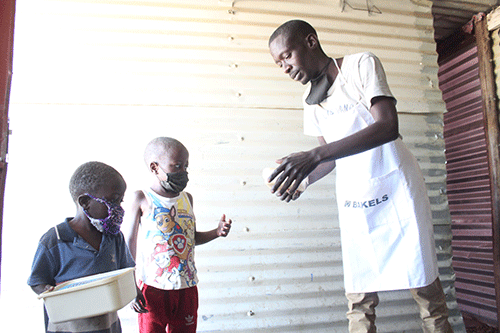Curious little faces peer around the door of the shack, eyes glued intently on the pot of soup just cooked.
They are waiting to collect what could be their only meal of the day.
For many of them, their schools, which are currently closed because of Covid-19 prevention measures, is their only access to one square meal a day as part of the government’s school-feeding programme.
“Children in the informal settlement are starving and it’s a scenario that is replicated in almost every corner of the country,” said Aluteni Nangolo.
He feeds roughly 50 children in the Goreangab informal settlement twice a day.
“I also wonder how I manage to pull through, but I believe God is my provider. Donations have also helped. Every dollar, bread, or tin of beans we have been getting from good Samaritans have helped us throughout the years.
“Every day many children show up to be fed, and I have to make sure I feed them. Just yesterday, I was wondering where I was going to get food to feed these kids next week, but someone sent me a N$300. So, it will sustain us for the next few days,” said Nangolo (40).
He established the humble care centre in the area in 2013 to combat hunger and children’s malnutrition in the community.
The unemployed Nangolo said with the current economic climate and the rise of unemployment in the country, the risk of children going hungry is even higher.
“With the little money I get from my close friends or donors, I always make sure my children have something to eat. I know how it feels to go to bed on an empty tummy, and I don’t want these children to experience what I have gone through,” said Nangolo, who calls himself the father figure to all children.
The Development Workshop Namibia, a Namibian NGO with a focus on sustainable urban development, informal settlements, and the disadvantaged communities, has also assisted the centre with food and stationery.
Despite hardships they endure on a daily, these children appreciate the gravity of the time and situation they are living in.
Economic destruction hit area hard
One of the mothers of children who eat at the care centre, said since the beginning of the pandemic last year, she has been unable to provide enough food for her children, hence sending them to the care centre.
“I can only afford to cook one meal a day, so they eat breakfast and lunch at the centre and I only cook dinner. The centre has really helped us feed our children,” she said on condition of anonymity.
Many hungry adults also hold out for food, said Nangolo.
“Some parents send their children to collect food at the centre and take it home, meaning some adults are taking advantage of the system to feed themselves, but that is not how it was supposed to be,” he said.
Nangolo is terribly concerned that if the lockdown continues, there will be a scramble for food by adults.
From being homeless to being a father to many
Born and raised in Windhoek, Nangolo dropped out of school in Grade 9 after his father died.
“Nobody was willing to pay for my school fees, so I left school. At some point, my mom kicked me out of her house into the streets, and that’s how I became homeless. I have literally been sleeping under bridges, begging for food,” he narrated.
In the early 2000s, Nangolo moved to the northern part of the country to live with his grandmother.
“While in the north, I found solace in Mrs Magdalena Shaanika, the principal of Golden Maggy Primary School. She gave me a job at her school, as a gardener, and I fell in love with children,” he said.
Asked what inspired his humanitarian work, Nangolo said: “When you suffer, you learn a lot. Working with children really made me a person.”
Nangolo started taking care of less-privileged children in the Oneshila informal settlement of Oshakati, before he moved back to Windhoek to register his kindergarten.
“When I came back to Windhoek, I worked as a taxi driver and I saved the income I generated to build a kindergarten. My wife and I eventually started the kindergarten, which grew into a care centre,” said the philanthropist.
They provide early childhood education to 40 less-privileged children in his area.
“I believe in education and I believe in the future of these children,” he said.
Nangolo envisions a bright future for not only his two biological children, but all the children he has been taking care of.
“My goal is to plant a seed of love and giving in these children. I want them to grow into prosperous adults. Even when I leave this earth one day, I would love for these children to pass on my knowledge to others and to take care of one another,” he said.
Nangolo can be contacted on 0813893020.
- ashikololo@nepc.com.na


